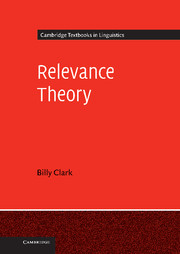Book contents
- Frontmatter
- Contents
- List of Figures and tables
- Preface
- Acknowledgements
- Typographical conventions
- Part I Overview
- Part II Details and developments
- 5 Explicature and implicature
- 6 Types of explicature
- 7 Types of implicature
- 8 Lexical pragmatics
- 9 Figurative language: metaphor
- 10 Figurative language: irony
- 11 Linguistic semantics
- 12 Conclusion: applications and recent developments
- Appendix Key notions of relevance theory
- Notes to chapters
- Bibliography and other resources
- Index
8 - Lexical pragmatics
from Part II - Details and developments
Published online by Cambridge University Press: 05 June 2013
- Frontmatter
- Contents
- List of Figures and tables
- Preface
- Acknowledgements
- Typographical conventions
- Part I Overview
- Part II Details and developments
- 5 Explicature and implicature
- 6 Types of explicature
- 7 Types of implicature
- 8 Lexical pragmatics
- 9 Figurative language: metaphor
- 10 Figurative language: irony
- 11 Linguistic semantics
- 12 Conclusion: applications and recent developments
- Appendix Key notions of relevance theory
- Notes to chapters
- Bibliography and other resources
- Index
Summary
Topics: words and concepts; words and inference; inferring concepts: broadening and narrowing; ‘ad hoc’ concepts
Overview
This chapter considers recent work on lexical meaning developed within relevance theory which has been described using the term lexical pragmatics. This work focuses on how words are understood in context. The central idea here is that the contribution of words with conceptual meanings involves more than simply accessing the concepts encoded by the words and slotting them into semantic representations. Comprehension also routinely involves adjusting the encoded concepts to reflect specific meanings intended by communicators. Work in this area has been carried out not only by relevance theorists but also by a number of linguists, philosophers and cognitive scientists. A starting assumption for many theories is that regular content words contribute to utterance meanings by encoding concepts. The chapter begins with a brief discussion of this and an illustration that understanding some words involves making inferences about exactly how they are being used on a specific occasion. Section 8.4 considers recent thinking on how ‘conceptual’ meaning is understood in context; in particular, it looks at processes of concept adjustment in the form of ‘broadening’ and ‘narrowing’. Section 8.5 considers the more radical assumption that human cognition and utterance interpretation involve the regular creation of unlexicalised concepts, i.e. concepts which are not the encoded meaning of any word, and are created as and when required as part of the processes involved in understanding each other and the world. This means that there is another kind of inference involved in deriving explicatures on the basis of linguistically encoded meanings, beyond the processes discussed in Chapters 5 and 6. The ideas discussed in this chapter have also played an important role in recent discussion of how metaphorical utterances are understood within relevance theory and so they are involved in the discussion of metaphor in Chapter 9.
- Type
- Chapter
- Information
- Relevance Theory , pp. 240 - 252Publisher: Cambridge University PressPrint publication year: 2013
- 1
- Cited by



